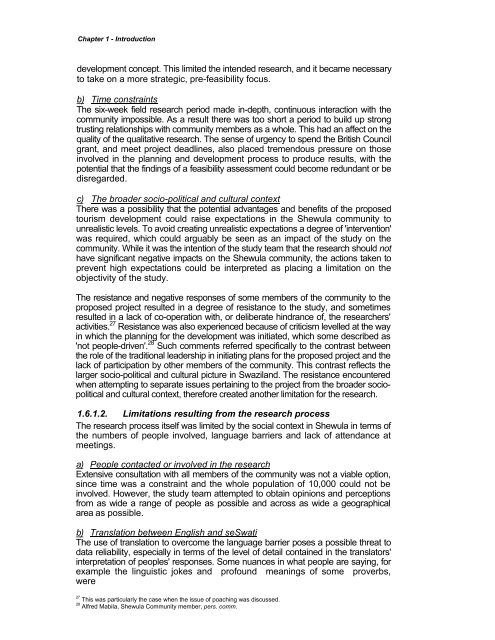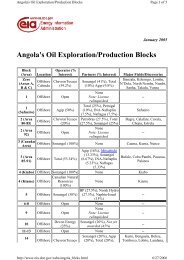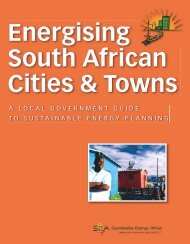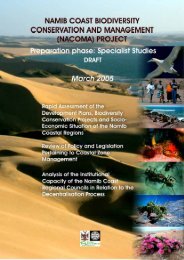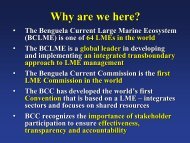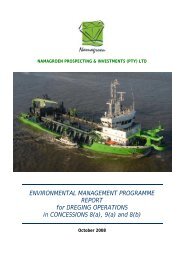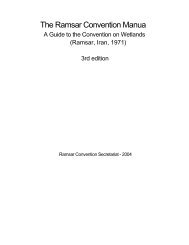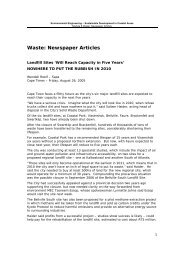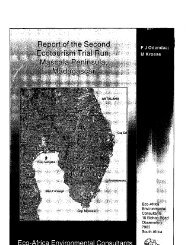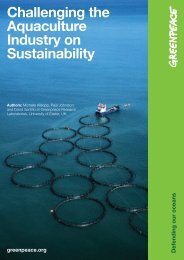Feasibility Study of Proposed Tourism Dev in Shewula, NE ...
Feasibility Study of Proposed Tourism Dev in Shewula, NE ...
Feasibility Study of Proposed Tourism Dev in Shewula, NE ...
You also want an ePaper? Increase the reach of your titles
YUMPU automatically turns print PDFs into web optimized ePapers that Google loves.
Chapter 1 - Introduction<br />
development concept. This limited the <strong>in</strong>tended research, and it became necessary<br />
to take on a more strategic, pre-feasibility focus.<br />
b) Time constra<strong>in</strong>ts<br />
The six-week field research period made <strong>in</strong>-depth, cont<strong>in</strong>uous <strong>in</strong>teraction with the<br />
community impossible. As a result there was too short a period to build up strong<br />
trust<strong>in</strong>g relationships with community members as a whole. This had an affect on the<br />
quality <strong>of</strong> the qualitative research. The sense <strong>of</strong> urgency to spend the British Council<br />
grant, and meet project deadl<strong>in</strong>es, also placed tremendous pressure on those<br />
<strong>in</strong>volved <strong>in</strong> the plann<strong>in</strong>g and development process to produce results, with the<br />
potential that the f<strong>in</strong>d<strong>in</strong>gs <strong>of</strong> a feasibility assessment could become redundant or be<br />
disregarded.<br />
c) The broader socio-political and cultural context<br />
There was a possibility that the potential advantages and benefits <strong>of</strong> the proposed<br />
tourism development could raise expectations <strong>in</strong> the <strong>Shewula</strong> community to<br />
unrealistic levels. To avoid creat<strong>in</strong>g unrealistic expectations a degree <strong>of</strong> '<strong>in</strong>tervention'<br />
was required, which could arguably be seen as an impact <strong>of</strong> the study on the<br />
community. While it was the <strong>in</strong>tention <strong>of</strong> the study team that the research should not<br />
have significant negative impacts on the <strong>Shewula</strong> community, the actions taken to<br />
prevent high expectations could be <strong>in</strong>terpreted as plac<strong>in</strong>g a limitation on the<br />
objectivity <strong>of</strong> the study.<br />
The resistance and negative responses <strong>of</strong> some members <strong>of</strong> the community to the<br />
proposed project resulted <strong>in</strong> a degree <strong>of</strong> resistance to the study, and sometimes<br />
resulted <strong>in</strong> a lack <strong>of</strong> co-operation with, or deliberate h<strong>in</strong>drance <strong>of</strong>, the researchers'<br />
activities. 27 Resistance was also experienced because <strong>of</strong> criticism levelled at the way<br />
<strong>in</strong> which the plann<strong>in</strong>g for the development was <strong>in</strong>itiated, which some described as<br />
'not people-driven'. 28 Such comments referred specifically to the contrast between<br />
the role <strong>of</strong> the traditional leadership <strong>in</strong> <strong>in</strong>itiat<strong>in</strong>g plans for the proposed project and the<br />
lack <strong>of</strong> participation by other members <strong>of</strong> the community. This contrast reflects the<br />
larger socio-political and cultural picture <strong>in</strong> Swaziland. The resistance encountered<br />
when attempt<strong>in</strong>g to separate issues perta<strong>in</strong><strong>in</strong>g to the project from the broader sociopolitical<br />
and cultural context, therefore created another limitation for the research.<br />
1.6.1.2. Limitations result<strong>in</strong>g from the research process<br />
The research process itself was limited by the social context <strong>in</strong> <strong>Shewula</strong> <strong>in</strong> terms <strong>of</strong><br />
the numbers <strong>of</strong> people <strong>in</strong>volved, language barriers and lack <strong>of</strong> attendance at<br />
meet<strong>in</strong>gs.<br />
a) People contacted or <strong>in</strong>volved <strong>in</strong> the research<br />
Extensive consultation with all members <strong>of</strong> the community was not a viable option,<br />
s<strong>in</strong>ce time was a constra<strong>in</strong>t and the whole population <strong>of</strong> 10,000 could not be<br />
<strong>in</strong>volved. However, the study team attempted to obta<strong>in</strong> op<strong>in</strong>ions and perceptions<br />
from as wide a range <strong>of</strong> people as possible and across as wide a geographical<br />
area as possible.<br />
b) Translation between English and seSwati<br />
The use <strong>of</strong> translation to overcome the language barrier poses a possible threat to<br />
data reliability, especially <strong>in</strong> terms <strong>of</strong> the level <strong>of</strong> detail conta<strong>in</strong>ed <strong>in</strong> the translators'<br />
<strong>in</strong>terpretation <strong>of</strong> peoples' responses. Some nuances <strong>in</strong> what people are say<strong>in</strong>g, for<br />
example the l<strong>in</strong>guistic jokes and pr<strong>of</strong>ound mean<strong>in</strong>gs <strong>of</strong> some proverbs,<br />
were<br />
27<br />
This was particularly the case when the issue <strong>of</strong> poach<strong>in</strong>g was discussed.<br />
28<br />
Alfred Mabila, <strong>Shewula</strong> Community member, pers. comm.


